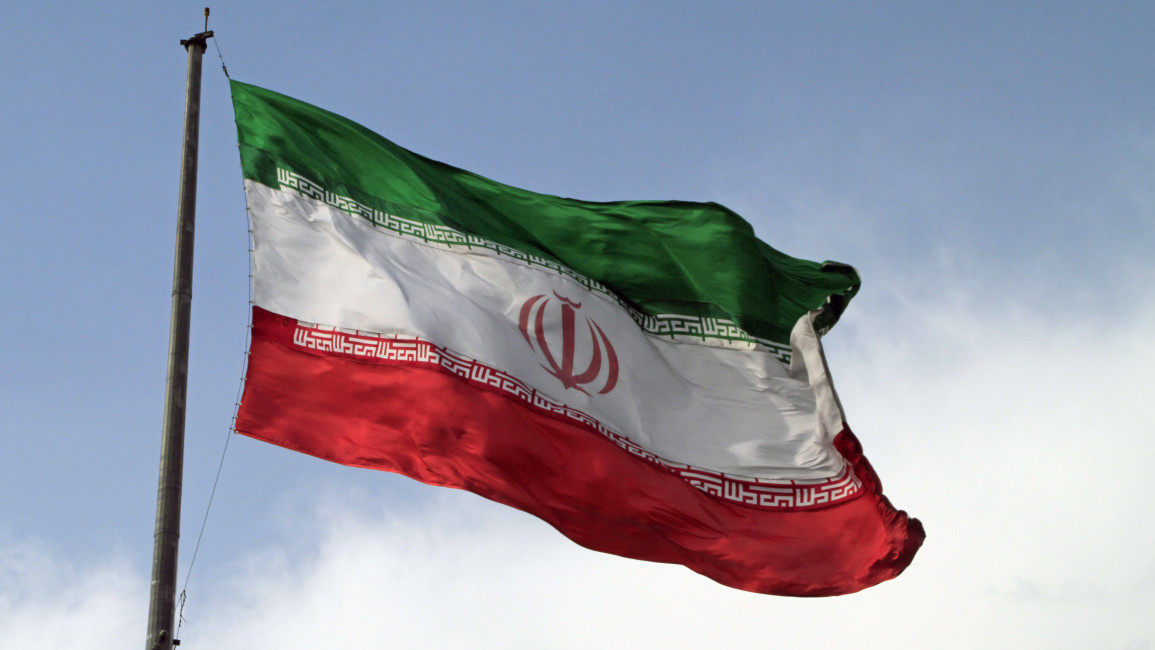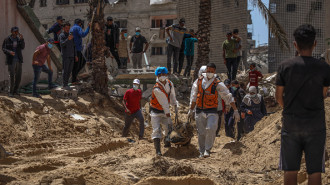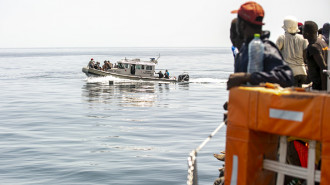Iran cities strike in solidarity with Zahedan's 'Bloody Friday' dead
Cities in western Iran went on strike on Wednesday in solidarity with mourners marking 40 days since security forces killed dozens in a crackdown on protests in the country's strife-torn southeast, rights groups said.
Security forces opened fire on protests that erupted on 30 September after weekly prayers in Zahedan, capital of the restive province of Sistan-Baluchistan on Iran's border with Pakistan.
It came two weeks after demonstrations broke out across Iran over the death of Mahsa Amini, a 22-year-old Kurdish Iranian woman, following her arrest in Tehran for allegedly breaking the country's strict hijab dress rules for women.
Amini's Kurdish first name can be spelt "Jina" or "Zhina".
The crackdown on nationwide protests since her death has killed at least 304 people, including 41 children and 24 women, says the Oslo-based group Iran Human Rights (IHR).
Activists were seen distributing fliers calling for protests in all cities on Wednesday for the 40-day mourning ceremony of Zahedan's "Bloody Friday", in a video shared by the 1500tasvir social media channel.
One of Iran's most prominent actors, Taraneh Alidoosti, also posted a photo of herself on Instagram without a headscarf and holding a slogan that has become the rallying cry of the protests: "Woman. Life. Freedom."
Widespread strikes were held "in solidarity" with Zahedan in the Kurdish cities of Baneh, Bukan, Kermanshah, Marivan, Sanandaj and Amini's hometown of Saqez, in the country's west, said the Norway-based Hengaw rights group.
'Angry and frustrated'
The trigger for the violence that IHR said left at least 92 dead in Zahedan on 30 September was the alleged rape in custody of a 15-year-old girl by a police commander in the province's port city of Chabahar.
But analysts say the Baluchi were inspired by the protests that flared over Amini's death, which were initially driven by women's rights but expanded over time to include other grievances.
"The 2022 protests are a convergence of angry and frustrated Iranians with the same goal, overthrowing the Islamic republic and a theocratic regime," said Saeid Golkar, from the University of Tennessee at Chattanooga.
Poverty-stricken Sistan-Baluchistan province is a flashpoint for clashes with drug smuggling gangs, as well as rebels from the Baluchi minority and Sunni extremist groups.
Activists have long complained the region has been the victim of discrimination by Iran's Shia Muslim clerical leadership, with disproportionate numbers of Baluchi killed in clashes every year and also hanged in executions.
Protests over Amini's death have shown no signs of abating despite the brutal crackdown and a campaign of mass arrests.
Young women have led the way, removing and burning their hijabs, chanting anti-regime slogans and confronting security forces on the street.
On Wednesday, reformist parties called for "courageous and innovative changes" including a referendum in a bid to end the crisis, according to a statement from the Iranian Reform Front, founded last year by officials close to former president Mohammad Khatami.
But Henry Rome, an Iran expert at the Washington Institute, suggested the "call will almost certainly wither".
"The regime is unable to coalesce around even modest reforms to defuse the protests; in a moment of turbulence, there's little prospect it would go so far as to put itself on the ballot," he said.
'Systematically silencing women'
Iran has struggled to suppress the demonstrations, which have evolved into its biggest challenge since the 1979 Islamic Revolution.
Security forces have fired directly on protesters using live ammunition, bird shot, tear gas and even paintballs.
Iran has sought to portray the protest movement as a plot hatched by its arch-enemies in the West, with the UK, Canada, the European Union and the United States imposing sanctions over rights violations.
How western leaders' "support" for the Iran protests lacks substance for the people of Iran and its diaspora to feel truly backed ⬇
— The New Arab (@The_NewArab) November 9, 2022
✍@KZiabari
#IranRevolution https://t.co/D8OIwY3rjC
The EU will seek to adopt further restrictions next week, German Foreign Minister Annalena Baerbock said on Wednesday.
"We won't let up," Baerbock said. "We stand with the men and women of Iran, not only today, but as long as it is necessary."
The Islamic Revolutionary Guard Corps was accused this week of issuing death threats against two journalists working for the London-based Persian-language Iran International television channel.
The Saudi-linked channel's owner, Volant Media, said London police had warned them of "credible threats to their lives".
In response, Iran's Intelligence Minister Esmail Khatib warned Britain it would "pay" for what it labelled actions to destabilise the Islamic Republic.
Khatib also accused Iran's regional rival Saudi Arabia of financing media outlets behind the wave of unrest, state news agency IRNA reported on Wednesday.
An unprecedented number of female journalists have been detained, which Reporters Without Borders (RSF) said "symbolically reveals the Iranian regime's intention to systematically silence women's voices".



